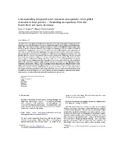| dc.contributor.author | Swatuk, L.A. | |
| dc.contributor.author | Motsholapheko, M. | |
| dc.date.accessioned | 2010-06-09T14:00:19Z | |
| dc.date.available | 2010-06-09T14:00:19Z | |
| dc.date.issued | 2008 | |
| dc.identifier.citation | Swatuk, L.A. & Motsholapheko, M. (2008) Communicating integrated water resources management: From globaldiscourse to local practice – Chronicling an experience from the Boteti River sub-Basin, Botswana, Physics and Chemistry of the Earth, Vol. 33, pp. 881–888 | en_US |
| dc.identifier.issn | 1474-7065 | |
| dc.identifier.uri | http://hdl.handle.net/10311/504 | |
| dc.description.abstract | The Boteti River is an ephemeral outflow of the Okavango River. It lies in the north-western part of Botswana
where about 25,000 people reside across a number of widely scattered villages and informal settlements.
The river, with its seasonal streams and pans, is vital to the livelihoods of these people, their
livestock, and the wildlife that share this physical space. A combination of factors has led to widespread
degradation of the physical resource base – both in the river bed itself and in the wider environment. As
part of its outreach role, the Harry Oppeheimer Okavango Research Centre has undertaken a multi-year
project along the Boteti River to assist people there with the rehabilitation of their resource base. The
globally influential concept of integrated water resources management (IWRM) provides the analytical
framework, in particular its emphasis on dialogue and stakeholder participation. The project has three
primary aspects: facilitation of a dialogue platform; action-research; outreach and information dissemination.
After two years of implementation, the project has collected a good deal of data and established a
River Basin Forum with a common vision. However, the project continues to face difficulties in implementation:
participation is limited; myths regarding resource degradation are difficult to dispel; meaningful
communication among differently empowered actors is hard to achieve; and there are numerous
human, financial and technological limitations. The primary researchers continue to alter their methods
in the hope of achieving a functioning River Basin Committee (RBC), but observe that the globalized ideals
of IWRM are, in this particular case at least, of limited use when attempting to alter localized management
practices in basins with deeply embedded social and cultural practices. | en_US |
| dc.language.iso | en | en_US |
| dc.publisher | Elsevier, www.elsevier.com/locate/pce | en_US |
| dc.subject | Project management | en_US |
| dc.subject | IWRM | en_US |
| dc.subject | River Basin | en_US |
| dc.subject | Botswana | en_US |
| dc.subject | Ngamiland | en_US |
| dc.subject | Boteti River | en_US |
| dc.title | Communicating integrated water resources management: From global discourse to local practice – Chronicling an experience from the Boteti River sub-Basin, Botswana | en_US |
| dc.type | Published Article | en_US |

